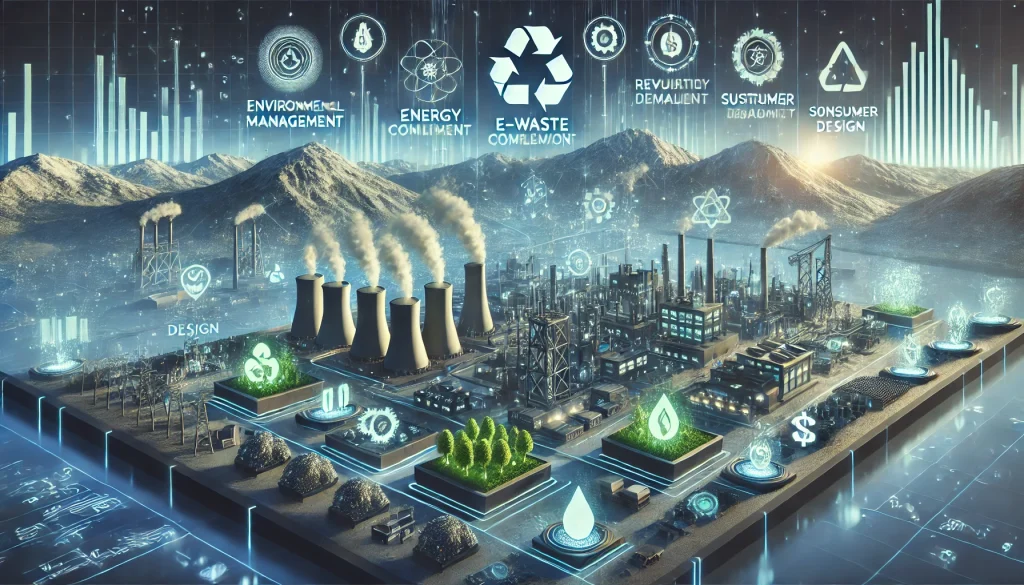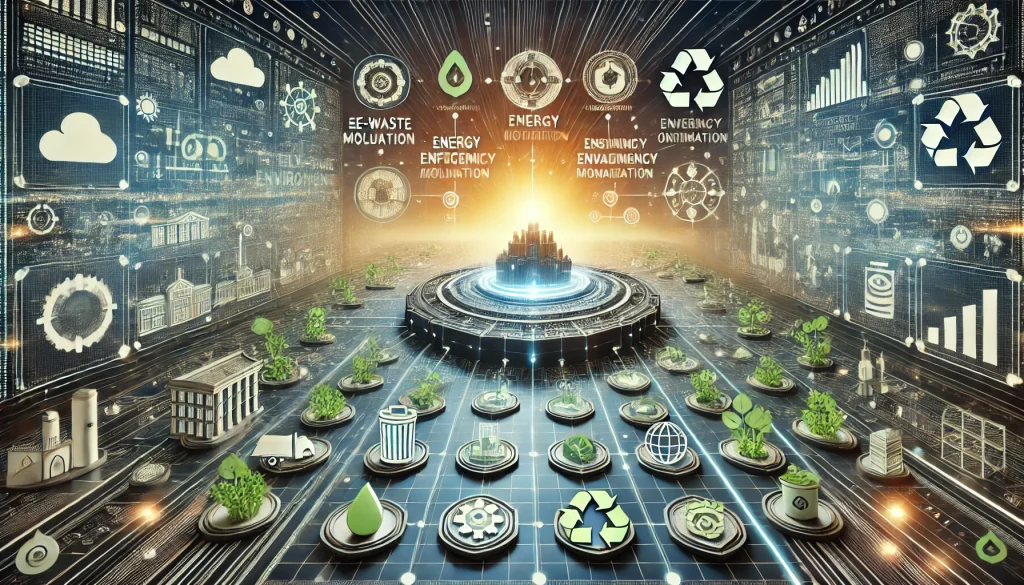Problem Statement
Tech companies must address the environmental impact of their innovations. From e-waste to energy consumption, developing sustainable technologies and practices is crucial for minimizing their ecological footprint and contributing to a healthier planet. The rapid advancement of technology has led to an increase in electronic devices, which in turn has resulted in a significant amount of electronic waste (e-waste). E-waste contains hazardous materials that can harm the environment and human health if not properly managed. Additionally, the production and operation of tech devices consume large amounts of energy, contributing to carbon emissions and climate change. Many tech companies are also reliant on rare and non-renewable resources, further depleting the earth’s natural reserves. Addressing these challenges requires a comprehensive approach that includes designing for sustainability, improving energy efficiency, and implementing effective recycling and disposal practices. Furthermore, companies must navigate complex regulatory landscapes and meet the growing consumer demand for environmentally friendly products. Achieving sustainability in the tech industry not only mitigates environmental impact but also enhances brand reputation and aligns with global efforts to combat climate change. A dedicated platform that provides tools and resources for sustainable innovation can help tech companies overcome these challenges, ensuring that their technological advancements contribute positively to the environment.
Pain Points
- E-Waste Management: Handling and recycling electronic waste effectively.
- Energy Consumption: Reducing the energy consumption of devices and operations.
- Resource Depletion: Minimizing the use of rare and non-renewable resources.
- Hazardous Materials: Managing the use of hazardous materials in tech products.
- Regulatory Compliance: Navigating environmental regulations and standards.
- Sustainable Design: Incorporating sustainability into the design and development process.
- Consumer Demand: Meeting the growing consumer demand for eco-friendly products.
- Supply Chain Sustainability: Ensuring sustainable practices throughout the supply chain.
- Cost Management: Balancing sustainability initiatives with cost-effectiveness.
- Innovation Integration: Integrating sustainable practices into the innovation process.

Future Vision
Our platform envisions a future where tech companies can seamlessly integrate sustainability into their innovations, minimizing environmental impact and contributing to a healthier planet. Leveraging advanced technologies such as AI, IoT, and blockchain, the platform will provide comprehensive solutions for e-waste management, energy efficiency, sustainable design, and regulatory compliance. AI-driven analytics will optimize resource usage and energy consumption, while IoT devices will monitor and manage environmental impact in real-time. Blockchain technology will ensure transparency and traceability in the supply chain, promoting sustainable practices from production to disposal. The platform will also offer tools for consumer engagement, helping companies communicate their sustainability efforts and build trust with eco-conscious consumers. By providing end-to-end support, our platform will empower tech companies to innovate responsibly, ensuring that their technological advancements are aligned with global sustainability goals. This vision will drive the tech industry towards a more sustainable future, reducing its ecological footprint and contributing to the fight against climate change.
Use Cases
- E-Waste Management Solutions: Tools for efficient recycling and disposal of electronic waste.
- Energy Efficiency Optimization: AI-driven analytics to reduce energy consumption in devices and operations.
- Sustainable Design Tools: Resources for incorporating sustainability into product design and development.
- Supply Chain Transparency: Blockchain-enabled traceability of materials and components.
- Real-Time Environmental Monitoring: IoT devices for monitoring and managing environmental impact.
- Regulatory Compliance Management: Automated tools for ensuring compliance with environmental regulations.
- Consumer Engagement Platforms: Tools for communicating sustainability efforts to consumers.
- Resource Optimization: Analytics for optimizing the use of materials and resources.
- Circular Economy Initiatives: Solutions for promoting recycling and reuse in the tech industry.
- Sustainability Reporting: Tools for tracking and reporting environmental performance.
Target Users and Stakeholders
- User: Sustainability Managers, Product Developers, and Operations Teams in Tech Companies
- Age Group: 30-50 years
- Gender: M/F
- Usage Pattern: Regular usage for managing sustainability initiatives, compliance, and reporting
- Benefit: Enhanced sustainability, reduced environmental impact, and improved regulatory compliance
- Stakeholders:
- Tech Companies: Businesses developing and manufacturing electronic devices and software
- Regulators: Agencies overseeing environmental compliance
- Consumers: Individuals seeking eco-friendly tech products
- Investors: Entities funding sustainable technology initiatives
- Environmental Organizations: Groups advocating for sustainable practices in the tech industry
Key Competition
- IBM: Provides AI and IoT solutions for optimizing energy efficiency and sustainability.
- SAP: Offers sustainability management solutions for various industries.
- Schneider Electric: Specializes in energy management and automation solutions for sustainability.
- Microsoft: Develops cloud-based solutions for sustainability reporting and compliance.
- Siemens: Offers integrated solutions for sustainable manufacturing and resource management.
Products/Services
- IBM Environmental Intelligence Suite: AI-driven tools for optimizing energy usage and managing environmental impact.
- SAP Sustainability Solutions: Tools for managing sustainability initiatives and compliance.
- Schneider Electric EcoStruxure: Energy management and automation solutions for sustainability.
- Microsoft Cloud for Sustainability: Cloud-based solutions for sustainability reporting and compliance.
- Siemens Sustainable Manufacturing Solutions: Integrated solutions for resource management and sustainable manufacturing.
Active Startups
- AMP Robotics: AI-driven robotics for sorting and recycling e-waste.
- R2 Recycling: Specializes in sustainable e-waste management solutions.
- Fairphone: Develops modular and repairable smartphones to reduce e-waste.
- Enevo: Uses IoT for optimizing waste collection and recycling.
- Loomia: Creates sustainable electronic textiles and components.
- Sourcemap: Provides supply chain transparency and traceability solutions.
- Bravus: Develops eco-friendly batteries and energy storage solutions.
- Sensoneo: IoT solutions for smart waste management and environmental monitoring.
- TerraCycle: Offers recycling programs for hard-to-recycle materials, including electronics.
- Loop: Provides circular economy solutions for electronics recycling and reuse.
Ongoing Work in Related Areas
- AI and Machine Learning: Enhancing resource optimization and energy efficiency in manufacturing.
- IoT and Automation: Developing smart devices for real-time monitoring of environmental impact.
- Blockchain: Ensuring transparency and traceability in the supply chain.
- Circular Economy: Promoting recycling and reuse of electronic components.
- Regulatory Compliance: Innovating tools for automated compliance with environmental regulations.
Recent Investment
- AMP Robotics: $55M in Series B funding led by XN, November 2020.
- R2 Recycling: $12M in Series A funding led by Next47, March 2021.
- Fairphone: $7M in Series C funding led by Pymwymic, April 2021.
- Enevo: $12M in Series B funding led by Lifeline Ventures, June 2020.
- Loop: $16M in Series A funding led by Sequoia Capital, January 2020.
Market Maturity
The market for sustainable technology solutions is maturing rapidly, driven by increasing regulatory pressures and growing consumer demand for eco-friendly products. Established companies like IBM, SAP, and Schneider Electric offer comprehensive sustainability management solutions, while innovative startups like AMP Robotics, Fairphone, and Loop are pushing the boundaries with cutting-edge technologies and circular economy models. Significant investments in AI, IoT, and blockchain are transforming the industry, enabling tech companies to optimize resource usage, reduce waste, and ensure compliance with environmental regulations. As the market continues to evolve, we expect more integrated and advanced platforms to emerge, providing end-to-end solutions for sustainable technology development and environmental impact management.
Summary
Tech companies must address the environmental impact of their innovations. From e-waste to energy consumption, developing sustainable technologies and practices is crucial for minimizing their ecological footprint and contributing to a healthier planet. Our proposed platform leverages AI, IoT, and blockchain to provide comprehensive solutions for e-waste management, energy efficiency, sustainable design, and regulatory compliance. Key pain points include e-waste management, energy consumption, resource depletion, hazardous materials, regulatory compliance, sustainable design, consumer demand, supply chain sustainability, cost management, and innovation integration.
Target users include sustainability managers, product developers, and operations teams in tech companies, with stakeholders encompassing tech companies, regulators, consumers, investors, and environmental organizations. Key competitors like IBM, SAP, Schneider Electric, Microsoft, and Siemens offer various sustainability management solutions. Active startups such as AMP Robotics, Fairphone, Enevo, Loop, and Sourcemap are driving innovation in this space. Recent investments highlight significant interest and growth potential in sustainable technology solutions.
By addressing these challenges and leveraging advanced technologies, our platform aims to create a sustainable tech ecosystem that aligns environmental responsibility with business success, driving innovation and fostering a healthier planet.
